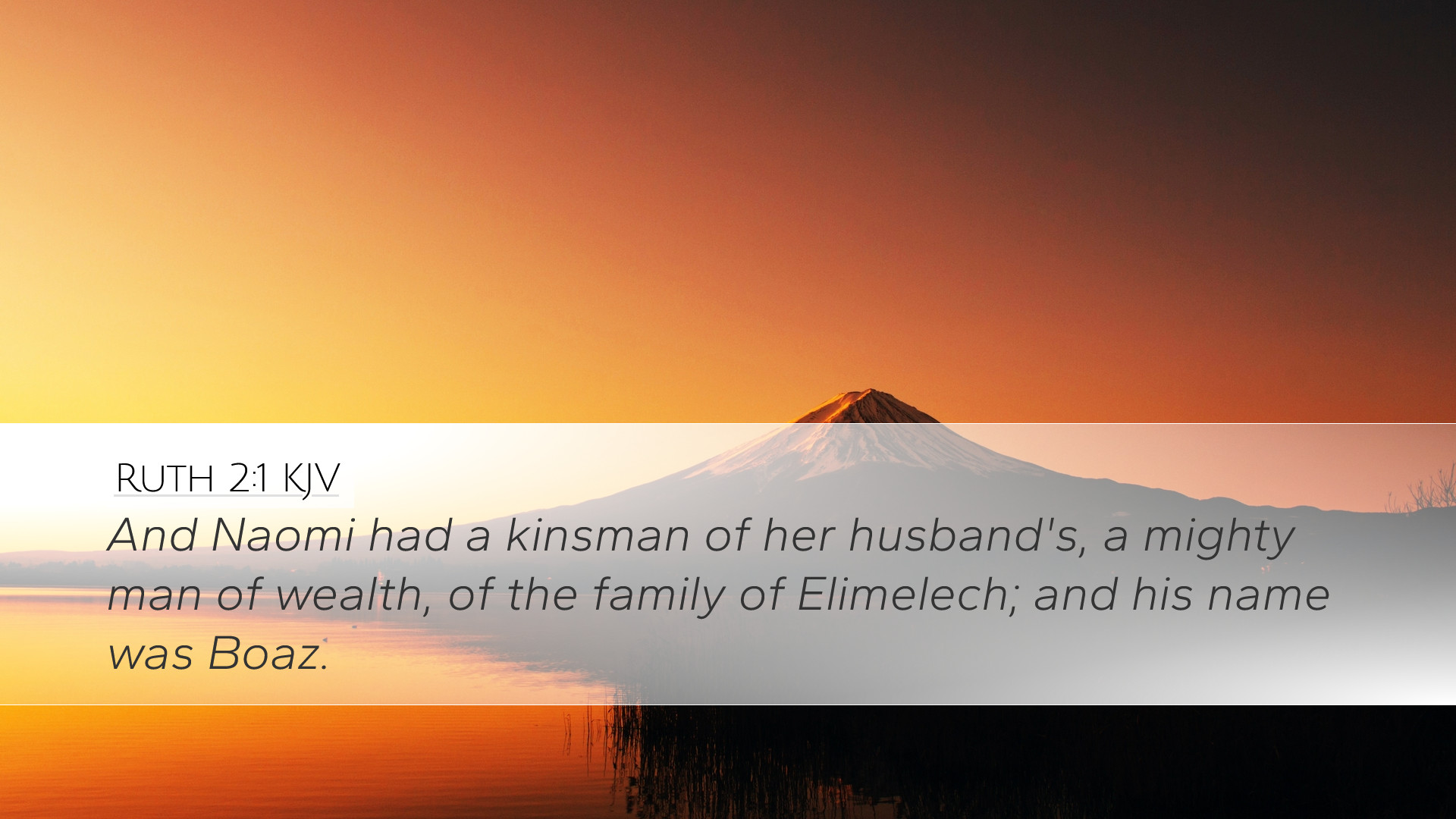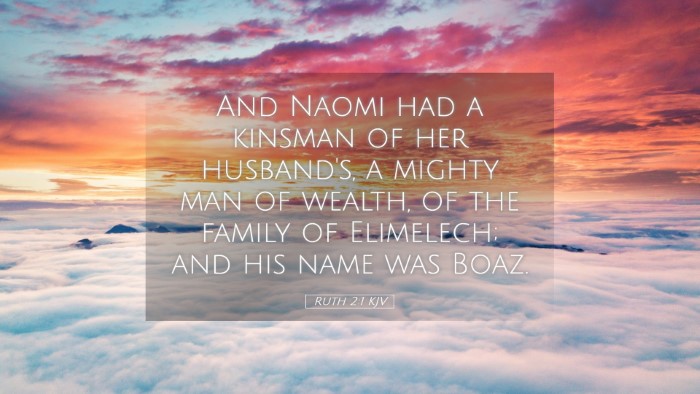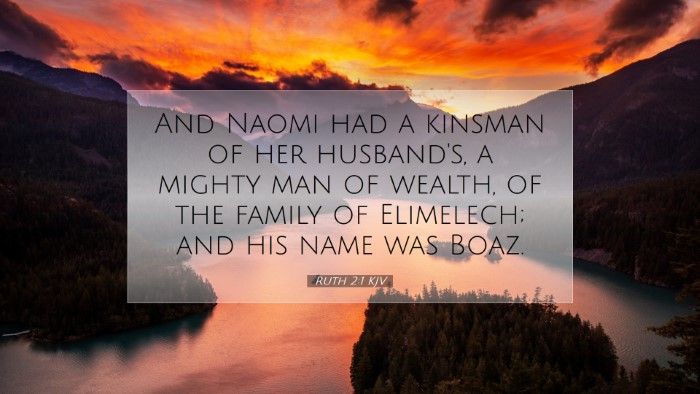Old Testament
Genesis Exodus Leviticus Numbers Deuteronomy Joshua Judges Ruth 1 Samuel 2 Samuel 1 Kings 2 Kings 1 Chronicles 2 Chronicles Ezra Nehemiah Esther Job Psalms Proverbs Ecclesiastes Song of Solomon Isaiah Jeremiah Lamentations Ezekiel Daniel Hosea Joel Amos Obadiah Jonah Micah Nahum Habakkuk Zephaniah Haggai Zechariah MalachiRuth 2:1
Ruth 2:1 KJV
And Naomi had a kinsman of her husband's, a mighty man of wealth, of the family of Elimelech; and his name was Boaz.
Ruth 2:1 Bible Commentary
Bible Commentary on Ruth 2:1
Contextual Overview: Ruth, a Moabite widow, returns to Bethlehem with her mother-in-law, Naomi, after the death of her husband. The narrative begins in a time of famine, which signifies a period of trial and hardship. As the story unfolds, we witness themes of loyalty, redemption, and God's providence in the lives of His people.
Verse Analysis
Ruth 2:1 states: “And Naomi had a kinsman of her husband’s, a mighty man of wealth, of the family of Elimelech; and his name was Boaz.”
Key Themes
- Kinship and Redemption: The mention of a kinsman signals the importance of familial relationships in Ancient Israel. According to Levitical laws, a kinsman redeemer had the duty to protect and provide for the family of a deceased relative.
- Wealth and Influence: The description of Boaz as a "mighty man of wealth" indicates his status and ability to help Naomi and Ruth in their dire situation, underscoring the role of societal standings in matters of provision and security.
- God’s Providence: The arrival of Ruth in Bethlehem coincides with the harvesting season, suggesting that God orchestrates events for His purposes, and emphasizes the theme of divine provision and care.
Commentary Insights
Matthew Henry
Matthew Henry elaborates on the significance of Boaz as a kinsman redeemer, highlighting the role of God's providence in providing a means of preservation for Ruth and Naomi. He suggests that the mention of Boaz serves not just to identify a potential helper, but to remind the readers of God’s timely provision during their trials. Henry sees Boaz as a foreshadowing of Christ, the ultimate redeemer, who looks upon the needy with compassion.
Albert Barnes
Barnes underscores the importance of "a mighty man of wealth" as not just financial prosperity but also moral and social strength. He points out that Boaz embodies the characteristics of nobility and generosity that are essential for a redeemer. Barnes emphasizes that the text presents Boaz as a figure of integrity; his wealth does not isolate him from the plight of the less fortunate, but rather equips him to be a steward in God's plan of redemption for Ruth and Naomi.
Adam Clarke
Clarke provides a historical and cultural perspective, stating that kinship obligations were taken seriously in Israelite society. He comments on the significance of the term "kinsman," as it ties back to the heritage and lineage, and explains how societal laws structured the relations and duties amongst God’s people. Clarke emphasizes that this moment in the narrative sets the stage for the unfolding divine appointment between Ruth and Boaz, underscoring that God's hand is evident in their lives through covenantal loyalty and familial ties.
Theological Implications
The blending of themes such as kinship, wealth, and providence in Ruth 2:1 invites profound theological reflection. For pastors and theologians, this verse serves as a reminder of God's active involvement in the lives of His people. It emphasizes how God raises resources and individuals amidst adversity, portraying His faithfulness and sovereignty. The figure of Boaz exemplifies God’s willingness to restore and redeem lives, making his character a vital study for understanding God's heart in times of trial and need.
Practical Applications
- Understanding Community Support: The importance of community within the church can be drawn from the dynamics between Naomi, Ruth, and Boaz, encouraging congregations to embody the principles of care and mutual support.
- Encouragement in Trials: As Ruth and Naomi faced despair, the unfolding of Boaz’s role as a redeemer offers hope to those in difficult circumstances, reminding them of God’s continual provision.
- Reflection on Stewardship: The wealth of Boaz serves as a model for how those blessed with resources should act towards the marginalized, advocating for a lifestyle that embraces generosity and social responsibility.
Conclusion
In conclusion, Ruth 2:1 serves as a critical pivot in the narrative, setting the stage for themes of providence and redemption. Insights from Matthew Henry, Albert Barnes, and Adam Clarke weave together a rich tapestry that enhances our understanding of God's workings through kinship and wealth. This verse not only informs the theological discourse surrounding the kinsman redeemer but also invites each believer to consider their role within the community of faith as agents of God's providential care.


